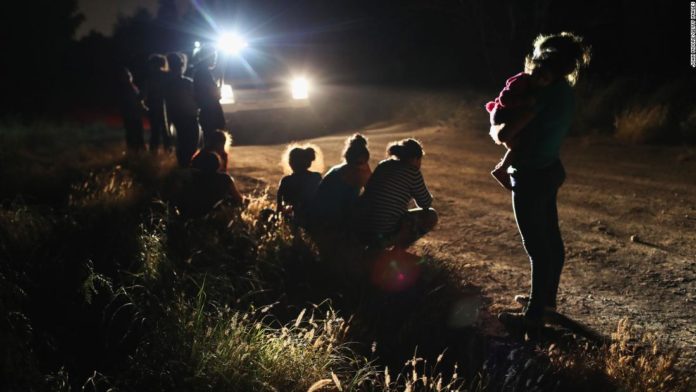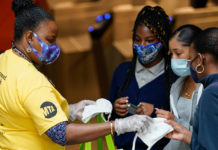Then Attorney General Jeff Sessions used her case to make it extremely difficult for her and women like her to get those protections.
The identity of the woman in the case remains anonymous. But her story is too familiar for the advocates and attorneys who work with thousands of immigrant women and immigrant women victims seeking the right to stay in the country.
Despite their stated objectives of cracking down on criminals and fraud, many of the Trump administration’s immigration policies have especially impacted the vulnerable and victims.
One policy change that could deter women victims from reporting their crimes takes effect Monday as the Senate deliberates whether to confirm Supreme Court nominee Brett Kavanaugh amid assault allegations against him, which he has vehemently denied.
Some of the changes were barely noticed. Others, like Sessions’ overhaul of asylum law, have generated numerous headlines.
But the sum total of those policies could put an already particularly vulnerable population even at risk, advocates who work with women say. And that could empower abusers and predators even further, they add, making everyone less safe.
The policies
A policy takes effect on Monday that could increase the risk of deportation for undocumented immigrant victims or witnesses of crimes. The agency that considers visa applications will begin to refer immigrants for deportation proceedings in far more cases, including when a person fails to qualify for a visa. The policy would also constrain officers’ discretion.
The new US Citizenship and Immigration Services policy specifically applies to visas designed to protect victims of violent crime and trafficking, including some created under the Violence Against Women Act. Those visas will give legal status to victims who report or testify about crimes.
The result: Victims who apply for the special visas but fall short, including for reasons like incomplete paperwork or missing a deadline, could end up in deportation proceedings. Previously, there was no guidance to refer all visa applicants who fall short to immigration court for possible deportation. Under the new policy, it’ll be the presumption. Advocates for immigrants worry the risk will be too great for immigrants on the fence about reporting their crimes.
Other policies that especially impact women and victims include:
- The now-reversed “zero tolerance” prosecution policy that separated thousands of parents and children who crossed the border illegally, many who said they were fleeing violence at home.
- Anti-sanctuary city efforts
- Reversing a policy to automatically seek the release of pregnant immigrants from detention, allowing the government to detain more of them.
- Seeking to keep teens in immigration detention from obtaining abortions.
- Dramatically lowering the number of refugee admissions to the US.
- Another Sessions ruling that would restrict immigration judges’ ability to close or suspend deportation proceedings while the immigrant is still waiting for the government to rule on their visa application. Some victims’ visas have years-long backlogs.
- Tightening asylum thresholds
- An expected move to stop issuing work visas to the spouses of high-skilled immigrants, which would impact immigrant spouses’ ability to have some independence in the marriage.
- Regulations being drafted
and arrests of immigrants at courthouses, which local police and immigrant advocates say has already had a chilling effect on immigrant victims reporting crimes.
that advocates fear diminish officers’ latitude to consider trauma as an explanation for certain behaviors. The concern is traumatized individuals could come across as noncredible when they are rather exhibiting symptoms of their trauma.
that would try to prevent immigrants from gaining asylum if they enter the US illegally.
When asked for a response on policies impacting victimized women, a Justice Department spokesman pointed CNN back to Sessions’ remarks in announcing the decision on the Salvadoran woman’s case.
“Asylum was never meant to alleviate all problems, even all serious problems, that people face every day all over the world,” Sessions said.
In a statement, Department of Homeland Security spokeswoman Katie Waldman pointed to the administration’s work to combat human trafficking, female genital mutilation and sex crimes, including through efforts by the agency’s immigration enforcement arms.
“The Administration’s policies promotes women — in fact, in the President’s first executive order he directed the Department to track violence against women,” Waldman said. “This administration is committed to securing the border and ensuring that we are preventing women and girls from being trafficked and abused at the hands of transnational criminal organizations and gangs during the dangerous journey north.”
As for the visa change on Monday, USCIS said that if someone does not have legal authority to be in the US, “it is expected” that they will leave.
“When they do not depart, USCIS will take appropriate steps to initiate the removal process,” said spokesman Michael Bars, referring to the victims’ or vulnerable persons’ visas at issue. “As such, notices to appear will generally be issued to VAWA, T, or U visa applicants or other petitioners who have failed to meet one or more of the eligibility requirements and are not lawfully present in the United States.”
Bars said immigrants could still appeal their denial, and that officials could use discretion “on a case-by-case basis” not to initiate a deportation case.
The impact
But advocates and attorneys who work with migrant women say the effect of the policies makes a vulnerable population even more vulnerable and puts them at further risk for abuse,
“I think that just like this administration’s policies across the board, women and children have particularly been impacted, because the administration is looking for the most vulnerable they can find,” said Michelle Brané, director of the Migrant Rights and Justice program at the Women’s Refugee Commission. “It’s gone after their access to protection, it’s gone after their basic rights, trying to limit those, and in doing so, it’s really driving people deeper into the shadows and more dangerous situations, and that makes us all more vulnerable.”
Immigrant women are particularly vulnerable to abuse for multiple reasons, experts say.
A major factor is their lack of status or dependence on a partner for status. Abusers and traffickers often try to control their victims using the threat of deportation. Many of the women are survivors of abuse in their home countries, and studies have shown that abuse survivors are more likely than others to be victimized again.
Furthermore, many of the women seeking protections in the US come from countries where they are viewed legally or culturally as the property of men, with domestic violence or assault not even being considered a crime in some circumstances.
“The cumulative effect is that I think women are more afraid than ever to come forward,” said Archi Pyati, the chief of policy and programs for the Tahirih Justice Center, which advocates for immigrant women and girls fleeing violence. “I think that we’re sending a message as a nation to immigrant women who are survivors of violence that there are essentially two classes of residents in the United States — those who get to have the protection of the state when they’re fleeing domestic violence and those who don’t.”
“Getting to that point takes every ounce of courage a woman has, for a woman to be able to climb out of that hole and break free from violence,” she continued. “The more that the door shuts, the more darkness she feels, the more isolated she feels, the more we are just putting weapons in the hands of her abuser.”
In their own words
Still fighting to stay in the US, the Salvadoran woman behind Sessions’ ruling, known only as AB, has declined interviews. Her attorneys released a statement on her behalf after Sessions’ decision.
“I think immigration judges have something against immigrants,” AB said. “They generalize about immigrants and think that they are coming to work. They don’t understand that we are fleeing for our lives.”
One woman who understands what AB is going through, though, is Aracely, a Honduran who has already secured protections in the US but would likely be denied under Sessions’ new policy.
She called this administration’s policies “very sad” and “something God will not forgive.”
“It makes me feel very sad because I wouldn’t want for mothers like me to suffer, knowing that they want to come to seek protection in this country, and they are denying them this opportunity to be able to live in peace and save their children,” Aracely told CNN in an interview translated from Spanish. One is willing to take the risk of so many dangers along the way, above all, because of the desire to feel protected in this country.”
CNN’s Catherine E. Shoichet contributed to this report.
Source : Nbcnewyork














